
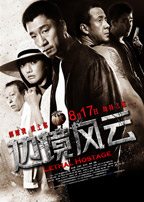
Bianjing Fengyun
China 2012
Genre:
Crime, Drama
Director:
Cheng Er
Cast:
Sun Honglei
Wang Luodan
Ni Dahong
Zhang Mo
Yang Kun

Lethal Hostage
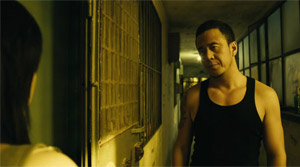
Story: During a drug trade the police turns up and one of the gangsters (Song Honglei) manages, with the help of a hostage, to
escape. His hostage is a little girl which is why he doesn't have the heart to kill her later. When he arrives at his boss he manages to save her life
by suggesting her as a means of exchange to get the boss' father free. In fact, the boss' father has been killed during the police raid. When the little girl's
father (Ni Dahong) meets with the gangsters as a mediator, the gangster realizes that the father carries a microphone. He doesn't tell his boss, though,
and later on pretends to kill the father so that the police can't continue putting him under pressure. In return for getting his daughter back the father is
supposed to fetch the goods which the gangster was able to hide before he escaped. However, the father is caught by the police and goes to prison.
From that day on the gangster takes care of the girl, which is especially difficult since his boss wants to see her dead. Therefore, the gangster gets rid
of his boss and himself becomes the leader of the drug cartel which is located in Burma. Ten years later the girl (Wang Luodan) has grown up and her father
is released from prison. But she rather wants to stay at the gangster's side...


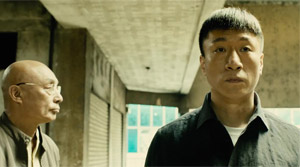


Review: Where Hong Kong suffers from a serious decline in quality China manages to gain some ground. At least when there aren't any
patriotic action flicks making the screens go full throttle and the cash flow at the box office. Anyway, "Lethal Hostage" is a surprisingly dark,
nihilistic crime drama that comes along with quiet tones and stylish pictures. A film-noir which clearly is carefully structured and knows exactly where it wants
to go at any time. This may make the flick seem a bit manipulative as well, but the trip into this cold gangster world ultimately is so fascinating because
the protagonists aren't that cold when taking a look behind their cold masks. After all, it's the relationship between the gangster and his
adopted daughter which is put into focus. Although it might be an obvious case of Stockholm syndrome there is a lot to be made out underneath which makes
the movie work so well.

First and foremost, it catches our eye that the movie is presented in the shape of four chapters and a prologue. Within those four chapters different
characters are standing in the foreground, we jump across different time levels and yet the events - when the characters are established - are at no point
in time difficult to grasp. Disorientating cuts which are supposed to make the cinematic work seem more complex than it actually is are the sort of cheap trick
the director doesn't need to utilize. The story is multilayered enough, particularly since the different plots are interwoven wonderfully. You never get the
impression that we are sticking with one of the stories for too long and even though it is obvious on which of them the focus lies, the subplots actually stand
on sort of equal footing with the drama around the gangster and his daughter/lover.
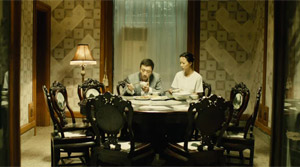
The way the different stories merge is wonderful and the sensitiveness with which the relationship between gangster and daughter is portrayed
is also fantastic. Whether the two are a couple in the end or not isn't that important and is left to your imagination, although the pregnancy test
does leave only little room for interpretation. In any case, that the two would sacrifice anything for each other becomes apparent especially strong during
one scene in which the girl lies down next to his adopted father in a grave which he was forced to dig for himself. It's those pictures in particular which
give the film its art house flair. Then again, there are also those scenes that could have been taken right out of a gritty crime thriller, just with a little
bit quieter atmosphere to it. Consequently, it's the smoldering tension that makes us sit at the edge of our seat. Especially during the finale this becomes
very clear. The calmness with which questions are asked that decide on life or death, the firing of guns, the passing away of some of the individuals, all
of this is composed with a great care for detail and captured with quiet pictures which don't lack the necessary amount of tension, though.
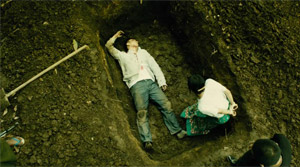
Sun Honglei ("Drug War") makes us suppose a few emotions in his expressionless face and when there are a few tears flowing they are
shed without any melodramatic sobbing. Even Wang Luodan ("Rise of the Legend") doesn't squint when tearing up.
The work you have to put into reading the emotions is always worth the effort, also when it comes to Ni Dahong ("Curse
of the Golden Flower"), whose role is characterized by a great amount of emotions, too; after all, his daughter was taken from him and at the same time
her and his life was saved - by one and the same man. Where all of this is supposed to end is sadly a bit predictable, though, since China's censorship
only leaves a small playing room. Cheng Er makes use of it for his movie very well, though. The twist towards the end makes us hope that China maybe might
loosen its tight grip in the future even more. Because that the ending was waved through by Chinese authorities is quite surprising.

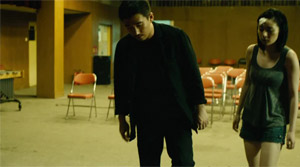
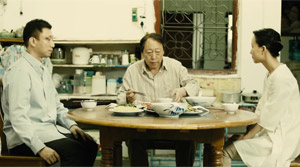

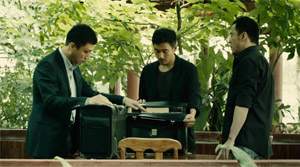
Next to the acting it's especially the pictures that are convincing. "Lethal Hostage" is a carefully composed and framed piece of work. The constant tension is also supported by a well achieved score by Chen Weilun. With all these words of praise it shouldn't be concealed that the movie, despite its mere 96 minutes running time and the subtle high level of tension, is also a bit lengthy at times. Particularly during the second half the pacing drops without a reason. However, the subtle note of this film noir makes it something special and gives it the kind of substance which you are normally looking for in the genre from China to no avail. Even if the movie sometimes seems a bit too slick and well composed you can't help but to recommend "Lethal Hostage" right away. And with Cheng Er China has a director in store who should have a bright future ahead of him.

Disclaimer










